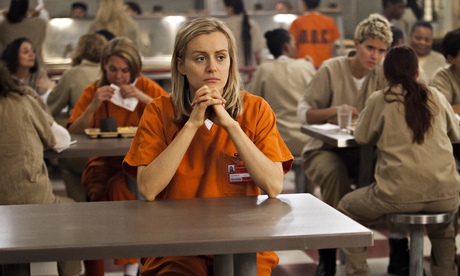
I used to work with a guy who didn't have a TV. He announced it proudly at any given opportunity. Someone would make a cultural reference and he would say – as drily as his secret glee would allow – "The Bill? What bill? I don't know what you're talking about, because I don't have a TV."
I hated that guy.
Now, I have become him. I don't have a TV. I only have Netflix. I am a Netflixer – and I have my reasons. I moved house last year and, when I went to plug in the TV, I found the cable had been severed. The next day, a TV licence demand came, asking money for television we couldn't watch.
Now we have nothing but Netflix, which makes you choose a programme you want to watch, and makes you decisively click on it. It also means if the internet breaks down you have find other means of entertainment, such as reading or talking to a fellow human. But that level of control was delicious after years of having a TV, when I would just pick a channel and allow it to pipe out its contents at me like a hose. I know you all have the power to switch off the TV and use your day to save the dolphins, learn to play the clarinet and write a novel, and I commend you. But some of us are, regrettably, rubbish.
There are cultural ramifications. Have you ever tried to explain a new TV show to a clueless Netflixer? It all sounds ludicrous. What am I supposed to do with my face when someone says, "It's celebrities skiing off a slope, for an hour", or "It's people having sex in a box then chatting about it"? I feel like I'm in a Little Britain sketch. (See how out of date my TV references are?)
In trying to avoid being perceived as a cultural numbskull, us Netflixers have to read TV reviews and Twitter to discover what people are squawking about. This means that everything comes tinted with the colouring of someone else's opinion – an op-ed, a nasty tweet, a BuzzFeed summing-up. When I read articles claiming that Celebrity Big Brother is actually good this time, eventually I have to take them at their word.
Not having a TV saves a lot of time. And not because I spend my newly free hours reading Dickens – I just get the edited highlights of rubbish telly on YouTube, so I can join in the discussion on who Alan Sugar fired last night. I have to do my homework just to avoid becoming the "Don't know what you're saying, I don't have a TV" person in the office.
Every now and again, a phenomenon such as Sherlock comes along, and Netflixers have to wriggle in on the action. BBC iPlayer saves the day – but without a TV licence, you can't live-stream. You have to wait, like some sort of Victorian. (I'm sure they'd never find out, but I can't shake the image of a face flashing up on screen à la Moriarty, saying: "Hello. You're attempting to watch BBC live without a TV licence. This laptop will self-destruct in five … four … three …")
This is a Netflixer's low point. Twitter and Facebook become minefields of spoilers and amateur reviews. Even the most innocuous statuses reveal all and temporarily ruin your life. An update that says "OMG – MARY!!!!" is a spoiler. I don't need verbs to work out that something shocking happens involving Mary, which means every single moment of Mary's screen time comes with anticipation and guessing.
Only when shows are finally on Netflix do we click our heels and enter the TV conversation. We get a taste of what it's like to be one of the cool kids in the know when shows are made exclusively for us. That's why House of Cards and Orange is the New Black have a special place in our hearts: they're the only shows I can watch and know the TV owners didn't see them first, years ago. The new seasons are on their way, TV-ers. Our time is coming.

